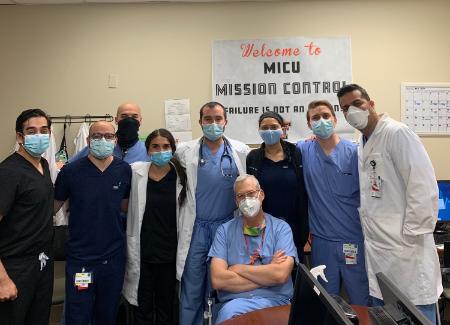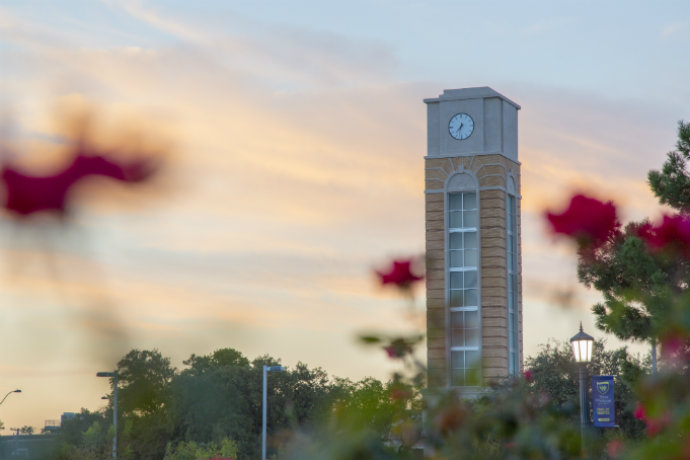Alumnus Victor Test Awarded the AMA Medal of Valor
.jpg)
Alumnus Victor J. Test, MD '86 was awarded the American Medical Association (AMA) Medal of Honor for his work on behalf of patients and his community during the COVID-19 pandemic.
But for Test, the medal isn’t just his — it’s for his entire team. It signifies all the hard work and dedication his staff did during the pandemic.
And his motivation comes from one veteran patient whose picture resides on his desk, Colonel Fox. Fox had been awarded the medal of honor in Vietnam.
“He said he was proud to have it and wear it for all the other marines who deserved it and didn’t get it,” Test said. “But when people pat me on the back, I try to remember what he told me.”
It was Fox that made the impression on Test of how to honor his entire team.
“I think about Colonel Fox every day. I just loved that man,” he said. “He changed my life.”
Remembering how Fox wore his medal for every other marine, Test wanted to take the advice and display his medal for everyone on his team.

“I think it’s important to remember that for every person that gets recognized, there’s an iceberg of people around them that did their job, did it well, put it on the line for someone else and nobody noticed,” Test said. “[My team] couldn’t have done it without each other.”
The medal was awarded to Test for his work with patients and the community at the Texas Tech University Health Sciences Center in Lubbock, TX. Test and his staff collected protective equipment and developed protocols to prepare for the pandemic before their first case in March 2020.
“We had the opportunity to take the information from Italy, China, New York and Washington and develop our protocols in advance,” Test said. “In terms of manpower, we knew there was going to be an issue. I essentially took all our older faculty’s clinical rotations in the ICU and did them — I did that to protect my division, because I knew they were going to be super stressed.”
Test then shared the protocols with surrounding hospitals, knowing that many facilities in the area weren’t accustomed to providing the level of care that would be needed during the pandemic. The hospital also shared equipment and face shields made from 3D printing with the other county hospitals.
During the time when the ICU was not allowing any visitors, Test and his staff called family members every night to give updates.
“It was a lot of work. We had to do daily updates on the patients,” he said. “It was really stressful. When you work in that kind of circumstance, and you know you’re going to lose a significant number of patients, it’s hard.”
He humbly added that, “I really don’t think what I was doing was all that extraordinary — we did what we had to do.”
Talking with patients while wearing masks made many patients and staff lose a feeling of connection. Hospital staff would walk around with a picture of them on their protective equipment so patients would know what they looked like.
“In the end, there’s no substitution for regular human interaction,” he said.
Test also worked to take care of his staff, calling yoga studios and counseling providers around Lubbock to provide online classes for them.
“We were really lucky because we didn’t lose any pulmonary critical care doctors,” Test said. “We didn’t lose any from illness or burn out — not to say we didn’t suffer from it. We kept the core of our nurses, too. In the end, I was trying to protect my [staff].”
But becoming a doctor was not something Test ever thought he would do.
As an undergraduate at Texas Wesleyan, Test studied biology with no initial plans to even become a doctor. He came to the university to major in history with the prospect of also becoming a tennis or basketball coach.
“If you had asked me my sophomore year, I probably wouldn’t have said I would become a doctor,” he laughed.
After taking science classes and having friends who were looking to go to the medical field, he felt inspired to also major in biology, which eventually led him to medical school.
“Every science class I took, the professors challenged me, inspired me and gave me confidence that I could do more. It made me wonder what I could do — could I achieve more than I thought I could,” Test said. “That’s really unique in education.”
He mentioned his tennis coach, Doc, many professors and fellow students that consistently motivated him to do more. He credits Texas Wesleyan with helping him find the confidence to become a doctor.
“I loved every minute I was at Texas Wesleyan, and I still do,” he said.
He encourages students who are looking to go into the medical field to love people, be hard workers and be dedicated to helping not just the patients, but fellow medical staff.
“Every day is a new adventure – some days good and some days bad. It can be hard. But to me, the benefit I get by making myself vulnerable to caring about people is what makes my job worth it,” he said. “It’s the best job in the world.”
For more information on our biology degrees, visit the biology major website.








